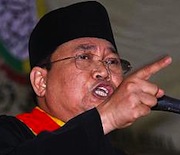(Kuala Lumpur Post) - The Chinese have received more, not equal, opportunities than the Bumiputeras in Malaysia, Perkasa said, as the debate over the alleged marginalisation of minority groups here raged on today.
Perkasa president Datuk Ibrahim Ali acknowledged Prime Minister Datuk Seri Najib Razak’s remark this afternoon that the Chinese have been given a “fair share” of opportunities to succeed but insisted this was not the case.
To illustrate his point, he said that large Chinese-owned corporations like YTL and Berjaya, as well as tycoon Robert Kuok, were given “special treatment” by the government.
“All gambling licenses, entertainment, and alcohol belong to non-Muslims and Muslims cannot be involved in this ‘haram’ (sinful) business,” Ibrahim told The Malay Mail Online.
“Even though Islam is the religion of the country, non-Muslims are allowed to do this ‘haram’ business. The Muslim does not protest.
“So what more do non-Muslims want?” he added.
Ibrahim’s remarks appear to be a repeat of a similarly provocative sentence used as a headline in Utusan Malaysia shortly after Election 2013 last May.
On May 7 last year, two days after Barisan Nasional (BN) returned to power in Putrajaya with a diminished vote majority and poor support from the Chinese, the Malay-language daily splashed the incendiary words — “Apa lagi Cina mahu” — on its front page. The article, a commentary, thrashed the country’s second-largest ethnic group for rejecting BN during the polls and also trained its guns on DAP, accusing the opposition party of racist politics.
Continuing his tirade today, Ibrahim also pointed out that the Chinese benefit when Bumiputera companies subcontract government contracts to Chinese-owned firms, a practice known as “Ali Baba”.
Prime Minister Datuk Seri Najib Razak said earlier today at an MCA function that a “fair share” of opportunities in Malaysia, coupled with Barisan Nasional (BN) policies that ensured peace and stability, have led to the success of the Chinese minority.
Perkasa secretary-general Syed Hassan Syed Ali, however, said Putrajaya had merely turned a blind eye to giving away Bumiputera privileges to the Chinese, such as approved permits (AP).
“It’s not that the government doesn’t know. They just close one eye because as long as the Chinese and the Bumiputeras share businesses, that’s good enough.
“If they were to leave it up to the Chinese, the Chinese would definitely not want to share with the Bumiputeras,” Syed Hassan told The Malay Mail Online.
In his visit here last weekend, US President Barack Obama said that Malaysia would not be able to succeed if non-Muslims are not given the same opportunities.
Najib acknowledged today unhappiness with the government’s pro-Bumiputera affirmative action policies and the way the New Economic Model (NEM) was implemented.
Last year, the prime minister announced a revised pro-Bumiputera NEM that provided the Malays access to over RM31 billion in aid and contracts, a move that critics said was a reversal of his promises to roll back race-based policies.
Najib, however, gave assurances today that Putrajaya would make the necessary adjustments to ensure that affirmative action for the predominant Malay community is based on merit.
The prime minister also stressed that the government’s intention was to eliminate rent-seekers and said he wanted to push Bumiputera-owned companies into proving they are “worthy” of getting government contracts.
Ibrahim welcomed Najib’s remarks on doling out pro-Bumiputera affirmative action on the basis of meritocracy, which the Perkasa chief said would give a leg up to “capable and committed” Bumiputeras.
“If not, there are Bumiputeras who ‘Ali Baba’ the projects, sell the permits, or sell what the government gives for fast money,” he said.
Ibrahim called for continuous pro-Bumiputera affirmative action to ensure that the predominant community owns 30 per cent of the economy by 2020, up from the present seven per cent.
“Strictly speaking, Bumiputeras only own seven per cent effectively. What is owned by institutions is not Bumi-owned,” said Ibrahim.
Syed Hassan cautioned Putrajaya not to focus too much on meritocracy to the detriment of small Malay businesses.
“Let the small fight with the small, and let the big fight with the big,” he said.
“Perkasa urges the government to give plenty of opportunities to small players, like in the 80s and 90s,” Syed Hassan added, as reported in The Malay Mail.

